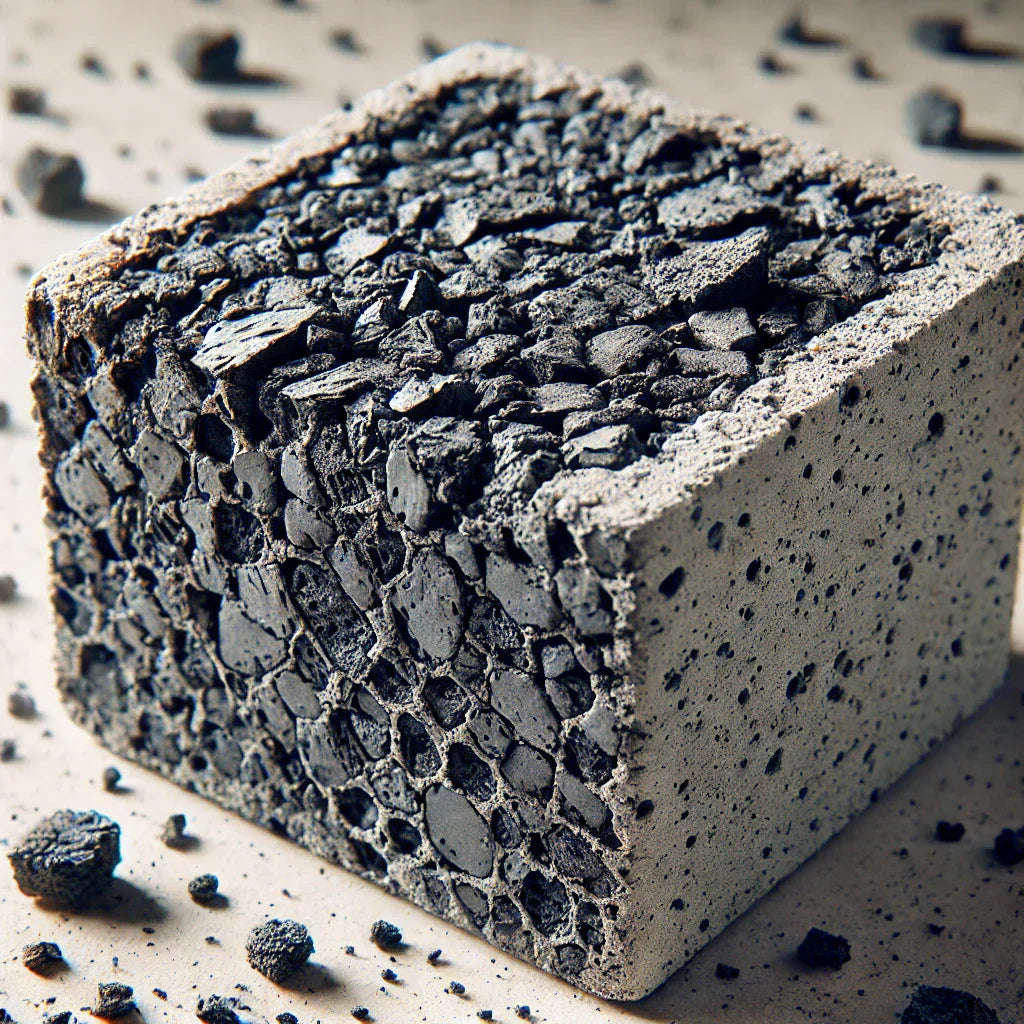
Alternate Uses For Biochar
Share
We talk a lot about the benefits of our biochar for soil, and rightfully so! It is well known that biochar can improve soil quality by preventing nutrient leaching, increasing soil aeration and acting as a remediate for soil pollutants etc. But did you know that biochar also has many other interesting and unexpected applications? Biochar is an excellent material that can be used for construction materials, animal bedding, odour management, soil remediation, water filtration and so much more!

Biochar for Construction Material
By incorporating biochar (usually at a rate of 3-5% by weight) into construction material, we not only enhance the material performance but also the overall sustainability within the construction industry. Studies have shown that by adding biochar into cement composites, the overall compressive strength of the material can increase by 3-13%. This is a result of the biochar’s porosity and high surface area, which enhances the bonding within the cement matrix. In addition, the low density of biochar means that it’s addition into composite material does not significantly increase the overall weight, making it ideal for applications where weight is a concern.
Apart from the structural benefits, the use of biochar in construction materials can aid in carbon sequestration, effectively trapping CO2 in the building environment. This can help in reducing the overall carbon footprints of construction projects, while also increasing the use of sustainable materials, aligning with global sustainability goals.

Biochar for Odour Control
Biochar has garnered a lot of attention as a medium for odour control across various applications. The high porosity and surface area of the material enables it to absorb and trap odorous compounds efficiently. For example, incorporating biochar in composting operations has been shown to significantly reduce ammonia and sulphur emissions, improving the air quality significantly. In addition, biochar can also be applied in a layer over manure lagoons, helping diminish odorous emissions from agricultural/ waste management industries. By utilising biochar in odour management strategies, you can not only manage unpleasant toxic emissions but also benefit from the environmental advantages of biochar such as its carbon sequestration qualities.

Biochar for Animal Bedding
Incorporating biochar into animal bedding is extremely beneficial for the farming/livestock management sectors. By mixing biochar at a rate of 10-20% by volume of animal bedding we can enhance the absorption properties of the bedding material. This helps keep the barns drier for longer periods of time, reducing the frequency of replacements of the animal bedding, and effectively cutting down any associated costs. Not only that, biochar can also absorb the ammonia emissions from animal waste, significantly reducing the odours within the barns and improving the air quality. Overall, the addition of biochar to animal bedding helps improve the living conditions and health of animals which can aid in decreasing veterinary expenses. To top it off, the used biochar-bedding can be applied to crops as soil amendment to reap its nutritional benefits and to close the agri-waste management loop.

Biochar for Water Filtration
The high surface area, porosity and chemical composition of biochar makes it an excellent water filtering medium. By mixing biochar at a rate of 1-10% by weight of the total filtration media helps to adsorb pollutants from water bodies and prevents its release into the environment. This is particularly advantageous for downstream processes in various industries, as activated biochar can be used as a filter to remove pollutants and other contaminants from wastewater.

Biochar for Remediation of Contaminated Sites
The chemical composition of biochar makes it an effective material to help ameliorate contaminated soils. By mixing 10-20% of biochar by weight to arid/ polluted soils, heavy metals and toxic organic compounds are immobilised completely. This is because the biochar adsorbs the contaminants and forms strong bonds with them, preventing contaminants from re-entering and detoxifying the soil. To add to this, biochar can also help improve the fertility of the soil as it is a great medium for microbial growth, which helps increase decomposition and overall nutrient cycling within the soil.

Influence of Pyrolysis Conditions and Feedstock Type on Biochar Applications
It should be highlighted that the properties of biochar and its potential applications are dependent on the feedstock used and conditions of the pyrolysis process. Certain variations to either of these result in rather different types of biochar that are best suited for specific applications. For example, biochar resulting from high temperature pyrolysis usually has a higher surface area and porosity, making it ideal for use as a water filtration medium. In contrast, biochar from low temperature pyrolysis has a specific chemical composition that enables it to bind to organic pollutants and heavy metals easily, making it ideal for use in soil remediation practices. When it comes to feedstock, biochar made from rice husks and other fibrous materials tend to be better suited as bio-filtration media, as opposed to biochar derived from wood, which tends to be better suited as a soil amendment.

Reducing odours, increasing soil fertility, remediating soils, filtering water, improving animal health - biochar can do it all! Biochar can help enhance/ replace the following (more unsustainable) materials and methods:
- Cement
- Gravel
- Tar
- Chemical fertilisers
- Peat
- Hay, wood shavings and sawdust (animal bedding)
- Chemical remediation treatments
- Charcoal water filters
- Reverse Osmosis Systems (water filtration)
- Chemical disinfection
- Plastic water filter
It is important to ensure that the conditions and feedstock by which the biochar is made aligns with your desired application. We have a team of sustainability consultants that know biochar inside-out. Get in touch to find out more about our pyrolysis process and how we can help create tailored biochar solutions based on your unique requirements.

